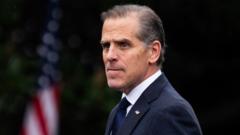Tulsi Gabbard has stripped 37 current and former US intelligence officials of their security clearances, alleging they politicized intelligence for personal gain, a move backed by President Trump. Critics view this as a political distraction from pressing issues.
Tulsi Gabbard Orders Revocation of Security Clearances for 37 Intelligence Officials

Tulsi Gabbard Orders Revocation of Security Clearances for 37 Intelligence Officials
In a controversial move, Tulsi Gabbard, Director of National Intelligence, revokes security clearances from multiple intelligence officials, citing politicization of intelligence.
In a dramatic shift in the country's intelligence landscape, Tulsi Gabbard, acting as the Director of National Intelligence, has taken the significant step of revoking the security clearances of 37 intelligence officials, both current and former. This move, carried out at the direction of President Donald Trump, is steeped in controversy as it is grounded in accusations that these officials have politicized intelligence for either partisan advantage or personal benefit.
The memo outlining this decision was disseminated via social media, yet Gabbard provided little tangible evidence to substantiate the claims made against the officials. Among those affected are individuals who were part of the national security apparatus under the administrations of former Democrats Joe Biden and Barack Obama. Security clearances are crucial for accessing sensitive government data and maintaining roles in both governmental and private sector jobs within defense and aerospace.
Gabbard's statement accused the targeted officials of “abusing the public trust" through actions like leaking classified information without authorization and breaching established tradecraft standards. “Being entrusted with a security clearance is a privilege, not a right,” she asserted on X, emphasizing that those within the Intelligence Community who prioritize their self-interests over their duties are in violation of their commitments to the nation.
Interestingly, the memo did not specify any concrete allegations against individual officials, which raises questions about the validity of the revocations. This latest action mirrors past ventures by the Trump administration to revoke security clearances, previously extending to President Biden, his Vice President Kamala Harris, and other officials linked to the investigations surrounding the January 6 Capitol insurrection.
Recently, Gabbard has also been at the forefront of criticism against intelligence officials who reported on Russian interference in the 2016 elections, calling such findings a "treasonous conspiracy" aimed at sabotaging Trump’s victory. Dismissed by many Democrats as a political maneuver designed to distract from other pressing matters, statements from officials connected to Obama have characterized the allegations as outlandish and an ineffective diversion. This ongoing saga continues to illuminate the contentious relationship between politics and national security in the current administration.





















